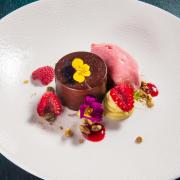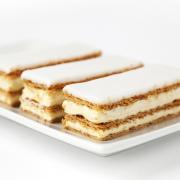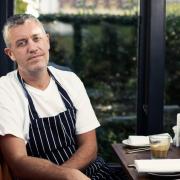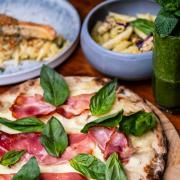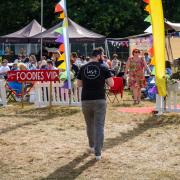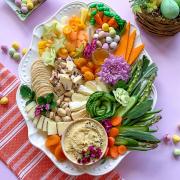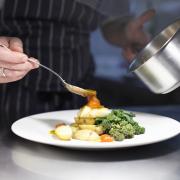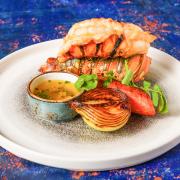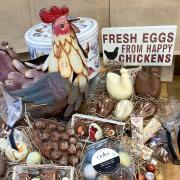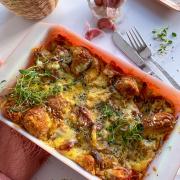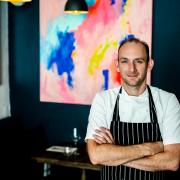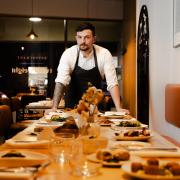It wouldn’t be Christmas without a turkey. We went to a small farm on the Wirral which spends half the year catering for our one day of gluttony
As we approach the paddock fence, hundreds of turkeys trot towards us to give us the once-over.
‘They’re quite inquisitive creatures. They do come and have a look,’ says Sally Lee who, at 54, has devoted her whole working life to turkeys. ‘I wouldn’t say they’re everybody’s favourite animal. They’re very cute when they’re young and fluffy, but they don’t grow into the most attractive things. But beauty is in the eye of the beholder.’
There’s a certain inevitability to the life of a turkey, but as her 1,100 birds enjoy the freedom of their paddock in a picturesque corner of Wirral near Willaston, Sally says: ‘I’d like to think they’re very happy.
‘Turkeys’ needs are quite basic. They need to be able to feed, to water and have shelter. They like to roost, they like to scrub around in the grass, they like to have dust baths. They sleep in large airy barns. We just open the doors in the morning and those that want to go out go and have a mooch, and those that don’t stay in. I think some don’t ever go out, yet others are at the door waiting.’
Sally’s firm, Traditional Wirral Turkeys, specialises in traditional turkey breeds - white, red, blue black and bronze. The black was possibly the turkey variety first sent to Europe from its native North America around 1498.
All these birds will end up on a Christmas dinner table within a 20-mile radius of the farm where Sally and husband Ronnie live. Two thirds of the birds will be collected by customers at the farm, to the strains of Christmas carols and an offer of a mince pie and sherry. The rest go to local butchers Edge and Son in New Ferry, Hopton’s in Hoole, Chester, and Bill Cage in Hoylake.
‘They will be 26 weeks old. To put that in context, the average supermarket-type bird would be anything from 12 to 14 weeks,’ says Sally. ‘Some may do 16 to 18 weeks on their speciality breeds, but that’s still ten weeks younger than mine.’
The difference is that the traditional breeds Sally rears are smaller-framed, slow-growing birds. They are free to wander (apart from being tucked away at night to avoid the predatory attentions of Mr Fox) and fed on cereal and whatever grass and bugs they wish to forage. Animal protein or growth promoters are not on the menu for these birds.
Sally started working with turkeys when her late father, who was managing director of British United Turkeys in Tarvin, got her a holiday job there. She then built a business at the family home using traditional breeds and supplying poults - day-old birds - to other farmers.
‘People are more interested in where their food comes from now, and they like to know it’s been reared locally and that things have had a nice life,’ says Sally. ‘That suits me down to the ground. People walk down here and see the turkeys, and they become a talking point.’
For more about Traditional Wirral Turkeys, go to www.traditionalwirralturkeys.co.uk. Prices of birds begin at £53 for a 5kg free range Wirral white. The farm also supplies extras such as gammon joints, sausages, pigs in blankets, stuffing, bread sauce and gravy.
The secret of a great Christmas turkey
By growing her traditional breeds slowly to maturity, Sally ensures they have a layer of fat around them and more breast meat than a supermarket bird. After slaughter, the birds are dry-plucked then hung in a chiller for up to two weeks.
‘It’s this that gives the meat its flavour,’ says Sally. ‘It’s like hanging good beef. When you hang these birds, you get that slightly gamey flavour. A lot of people complain that turkey is bland and dry. There’s absolutely no reason why it should be like that.’
After being eviscerated, the turkeys are boxed with herbs.
Sally is reluctant to lay down hard and fast rules on cooking times and temperatures, as these depend upon your oven - conventional, fan-assisted, Aga or whatever.
But she does say: ‘They should leave it to come to room temperature. The bird should be stuffed at the neck end, not the cavity end, and maybe put an onion in its rear end. Wrap it in foil and baste it with something of your choice.
‘I have a fantastic gizmo called a turkey popper - a little plastic thermostat that you insert into the breast and when the meat is cooked the little indicator pops up. I give them away free with the bird, and they are marvellous.’




